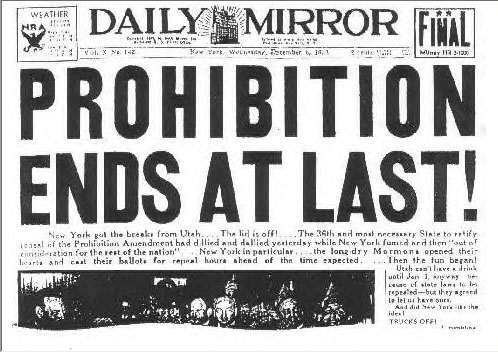....And Criminals into Kings . Fueled the Jazz Age & made the 1920's roar . But also was a time of extremely polarized politics where one group tried to legislate morality on another large segment of US citizenry ...
Master documentary film maker Ken Burn's and Lynn Novick's new effort for PBS the Film :
"PROHIBITION "
http://www.youtube.com/watch?v=bJdKK6L8Z2o
( this should be real good , must see )
“Prohibition” is a three-part, five-and-a-half-hour documentary directed by Ken Burns and Lynn Novick that tells the story of the rise, rule, and fall of the Eighteenth Amendment to the U.S. Constitution. The film starts in the 18th century with the early history of alcohol in America and examines the 19th century temperance and progressive movements. ”Prohibition” tells the story of famous and lesser known characters from the era, including Al Capone, Roy Olmstead, George Remus, New Yorker columnist Lois Long, repeal activist Pauline Sabin, and politician Al Smith.
The film also tells the story of American politics, immigrant culture, rural vs. urban life, the KKK, and music and film – the very culture that was spurred into creation by the open consumption of alcohol in an era known for prohibiting its use. ”Prohibition” raises questions about how we as a society should try to deal with alcohol and alcoholism, what responsibilities government can and should have for individual behavior, and the potential dangers of expecting government to resolve social or moral disputes.
"You end up with laws and policies that don't make any sense and then you can't find a way out of it, and that's what happened with Prohibition," she said. "It went on for a very long time because once the two sides were set, there was no room for conversation about, 'This isn't working, how can we fix it, what should we do?"
"None of that happened for quite a long time," He said. " Prohibition broke down the respect for law and law enforcement, corruption was pervasive. ... It was a corrosive problem."
Master documentary film maker Ken Burn's and Lynn Novick's new effort for PBS the Film :
"PROHIBITION "
http://www.youtube.com/watch?v=bJdKK6L8Z2o
( this should be real good , must see )
“Prohibition” is a three-part, five-and-a-half-hour documentary directed by Ken Burns and Lynn Novick that tells the story of the rise, rule, and fall of the Eighteenth Amendment to the U.S. Constitution. The film starts in the 18th century with the early history of alcohol in America and examines the 19th century temperance and progressive movements. ”Prohibition” tells the story of famous and lesser known characters from the era, including Al Capone, Roy Olmstead, George Remus, New Yorker columnist Lois Long, repeal activist Pauline Sabin, and politician Al Smith.
The film also tells the story of American politics, immigrant culture, rural vs. urban life, the KKK, and music and film – the very culture that was spurred into creation by the open consumption of alcohol in an era known for prohibiting its use. ”Prohibition” raises questions about how we as a society should try to deal with alcohol and alcoholism, what responsibilities government can and should have for individual behavior, and the potential dangers of expecting government to resolve social or moral disputes.
"You end up with laws and policies that don't make any sense and then you can't find a way out of it, and that's what happened with Prohibition," she said. "It went on for a very long time because once the two sides were set, there was no room for conversation about, 'This isn't working, how can we fix it, what should we do?"
"None of that happened for quite a long time," He said. " Prohibition broke down the respect for law and law enforcement, corruption was pervasive. ... It was a corrosive problem."
Last edited:










